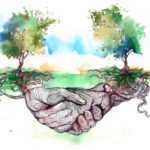By Francesca Mason Boring
An optimist isn’t necessarily a blithe, slightly sappy whistler in the dark of our time. To be hopeful in bad times is not just foolishly romantic. It is based on the fact that human history is a history not only of cruelty but also of compassion, sacrifice, courage, kindness. What we choose to emphasize in this complex history will determine our lives. –Howard Zinn
For many years this quotation has been on my desk. When I have the privilege of working with individuals and families who bear the scars of history I am lightened and humbled by the celebration of resilience and capacity.
I am a pragmatist. When there is political unrest, I try to find something I can do. I make phone calls or send letters to representatives, stand with fellow citizens, read and engage in conversations that expand my understanding of issues. I pulled my first lever in a voting machine when my father took us into a voting booth and lifted us up to help cast his vote. The kinesthetic power of that vote, coupled with some simply framed story about people who were not allowed to put their hands on such a tool- could not send their voice through the ethers- hearing that we have opportunity to have a part in determining who runs our country, (as our servants); the excitement of getting up early to assure the interest of the powerless has never left me.
From the indigenous side of my family it was important to understand that how I walk on the earth has consequence. Everything is connected. All of life is involved in some kind of process. The need for a snake to shed her skin to grow, a grasshopper to struggle to escape her exoskeleton in order to fly, every movement in nature is a teaching and we have the choice to benefit from those lessons, or walk our own way in ignorance.
Having multicultural roots I always experienced family, politics, and observations as framed within the context of history and story and connection. Family systems constellation is a contextual framework for understanding the impact of such nuance.
In constellation work, we may encounter fellow human beings who have focused for years on pathology and victimhood. When Anngwyn St. Just, PhD gave an interview in Croatia; she spoke of the ability to address injury without being stuck in a ‘victim identity’. We are often stunned to have opportunity to witness in a constellation a 3-D representation of the strong spines of survivors of individual or communal suffering. This is one of the beauties I hold dearly in systems constellation. We are invited to hold paradox. It can be true that there has been injury, and it can also be true that it is not mandatory that one have a lifetime of loyalty to that pain at the sacrifice of joy.
Hellinger’s distinction between blind love and enlightened love gives both phases of metamorphosis in relationship a place. Yes, there is an introduction to love which is full of hormones and a lovely fog. In this place there is little discussion of responsibility, or availability, or choice. And, if one has the capacity or has an interest in complexity, there is an opportunity for a subsequent emergence of enlightened love. This is a path which requires accountability and maturity. It is not completely devoid of the lightness of romance, but it is not a sprint, it is a journey.
In family constellation, in the ‘enlightened’ phase of love we are invited to understand our partner in context. What have they survived? What have they experienced? What do they believe; which of those beliefs are founded in misinformed loyalties and which beliefs are based upon necessary, survival directed adaptations? We are invited to a different paradigm by finding the answers for ourselves as well.
The power of making the choice of political engagement and personal and familial connection invites the experience of adventure. Notably, ‘adventure’ is a word that is being used more frequently to describe systems constellation work. The experience of being willing to commit to something that cannot be fully known in advance, to be able to accept those mountains which are fixed and those fields which are open is a way of being that we as human beings are designed for.
Within our own system, and when we accompany others in a constellation, we have the invitation to continue, to rest, to stop, or to decide to go another way. Nature does not judge our choice and perhaps she can provide the tutelage we need to be open to those journeys that are ready to be supported.
I used to go with a Native Elder to dig roots. She had some physical limitations which were often apparent if she was walking in a building or on concrete, but in nature, while I was digging under her direction, her ancestral stories, remembrances and teaching completely discarded her pain. My sweat, her voice, the resonance of those who had eaten the roots a thousand years ago -all merged to make space for tragedies and humor.
In family systems constellation we are challenged to hold a wider view, a perspective that includes not just the scars, but the miracle, the legacy of healing wounds. This expanse so naturally engenders optimism.

